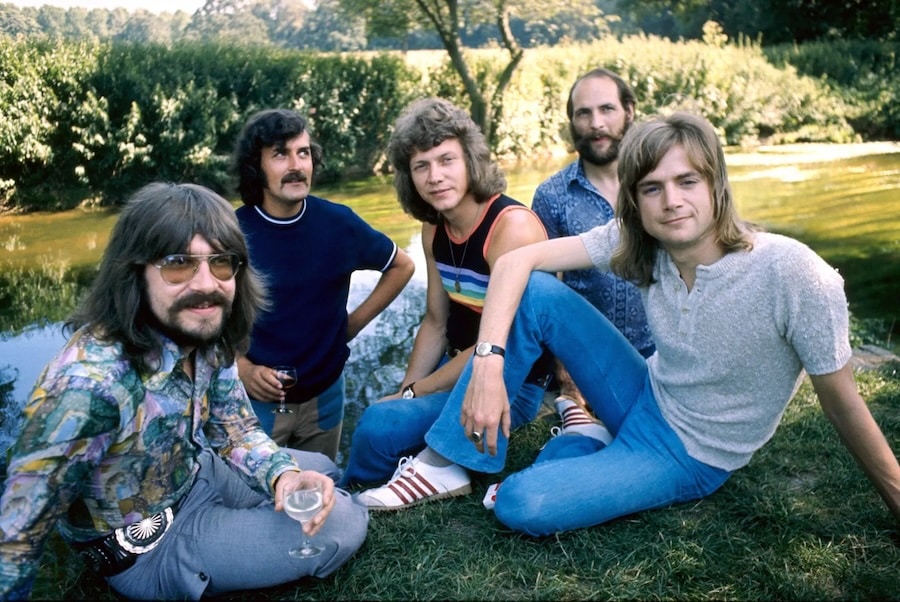Justin Hayward rules out The Moody Blues reunion, won't join John Lodge again

Justin Hayward, the legendary voice and guitarist behind The Moody Blues, has recently made headlines with his firm stance against a band reunion, notably excluding John Lodge from future plans. This declaration has stirred up feelings among fans and sparked curiosity about the reasons behind his decision and the implications for the band's legacy.
- Why Justin Hayward Won't Reunite With John Lodge
- The End of The Moody Blues Era
- Justin Hayward's Solo Career Plans
- The Impact of Mike Pinder on The Moody Blues
- John Lodge's Perspective on The Band's Future
- Memorable Moments From The Moody Blues' History
- Related Questions on The Moody Blues and Their Legacy
Why Justin Hayward Won't Reunite With John Lodge
The question on many fans' minds is why Justin Hayward says "no" to The Moody Blues reunion with John Lodge. Hayward has expressed a strong desire to concentrate on his solo endeavors, a focus he has maintained since the band's last tour in 2018. The connection between Hayward and Lodge remains intact offstage, yet the prospects of them playing together again seem dim, with Hayward's recent announcement underlining his solo career intentions.
Hayward's decision not to reunite is not a sudden one; it has been a gradual process that aligns with the evolution of his artistic journey. While the camaraderie between the surviving members of The Moody Blues is evident, Hayward's solo aspirations have now taken precedence, leading to a decisive separation in their musical collaboration.
The Moody Blues were pioneers in progressive rock, and with a career spanning over five decades, it is not surprising that individual members would seek new creative outlets. Hayward's resolution serves as an affirmation of this new chapter for each of the band's members, albeit bittersweet for those longing for their combined artistry.

The End of The Moody Blues Era
The announcement by Justin Hayward won't join John Lodge again marks a poignant end to an era that has left an indelible mark on the music industry. The band's history is etched with monumental achievements, and their final tour in 2018 may very well have been the last page of The Moody Blues' collective performances.
With the passing of founding member Graeme Edge, the band's continuity was cast into doubt. Hayward's recent statement suggests a conclusive end to The Moody Blues as a performing entity, though their music will undoubtedly continue to resonate with fans around the world.
The group, renowned for their fusion of rock and classical music elements, leaves behind a legacy that has influenced countless artists and genres. In their absence, the records, the memories, and the impact of their progressive sound will remain a testament to their groundbreaking work.

Justin Hayward's Solo Career Plans
Amidst the backdrop of band disbandment talks, Justin Hayward's solo career plans are coming into sharp focus. Anticipation is building around his solo tour, which is set to showcase his musical genius in a more personal and intimate setting.
Hayward's artistry is not limited to his past with The Moody Blues; he continues to evolve as a musician and songwriter. His upcoming solo career endeavors in 2024 hint at the promise of new material, collaborations, and live performances that will extend his influence in the music world.
See Also: Keith Richards facts: Rolling Stones star's life and legacy at a glance
Keith Richards facts: Rolling Stones star's life and legacy at a glanceFor fans of Hayward's melodic storytelling and distinctive voice, the prospect of his solo tour is an opportunity to experience his craft in a new light, reaffirming his status as one of rock's most enduring figures.
![Justin Hayward - Forever Autumn (1978) [with lyrics on screen]](https://i.ytimg.com/vi/77rinB5pYqA/hqdefault.jpg)
The Impact of Mike Pinder on The Moody Blues
The Moody Blues' unique sound can be attributed in part to Mike Pinder's mellotron, an instrument that became synonymous with the band's sonic identity. Pinder's innovative use of the Mellotron helped to define the genre of progressive rock and set The Moody Blues apart from their contemporaries.
Hayward has often reflected on the significance of Pinder's contributions, acknowledging the Mellotron's role in creating the band's ethereal and lush soundscapes. Pinder's musicianship and technical prowess were instrumental in the group's success, leaving a lasting influence on their music.
Though no longer part of the band, Pinder's legacy within The Moody Blues continues to be celebrated by fans and musicians alike, illustrating the enduring quality of his work with the group.
John Lodge's Perspective on The Band's Future
While Hayward has been vocal about his solo aspirations, John Lodge's perspective on the band's future reveals a different facet of The Moody Blues' narrative. Lodge remains passionate about music and performing, evidenced by his ongoing solo performances and plans for more tour dates.
Lodge acknowledges Hayward's preferences but maintains an optimistic outlook on what lies ahead. His dedication to the craft is clear, as he continues to bring the spirit of The Moody Blues to life on stage for fans across the globe.
Even in the face of uncertainty regarding the band's collective future, Lodge's commitment to his music and his audience is unwavering, suggesting that while the band may not reunite, the music will never truly die.
Memorable Moments From The Moody Blues' History
The Moody Blues' journey is filled with memorable moments that have cemented their place in rock history. From pioneering concept albums to creating timeless hits, the band has left an indelible mark on the music landscape.
Notable highlights include their groundbreaking album "Days of Future Passed," which married classical music with rock, and the chart-topping success of "Nights in White Satin." Their innovative approach to music production and live performances set new standards for what rock music could achieve.
See Also: Bon Jovi's 10 greatest songs, ranked: The definitive list
Bon Jovi's 10 greatest songs, ranked: The definitive listEach member's unique talents contributed to the band's distinctive sound, creating a tapestry of musical achievements that continue to inspire new generations of musicians and fans alike.

Why Did Michael Pinder Leave the Moody Blues?
Michael Pinder, known for his role as a keyboardist and the use of the Mellotron, left The Moody Blues in the mid-1970s. Pinder sought a change in lifestyle and moved away from the music industry's pressures, choosing to focus on his family life and personal interests.
Despite his departure, Pinder's influence on the band's sound and progressive rock is still recognized today. His contributions to The Moody Blues during their formative years played a critical role in their artistic and commercial success.
When Did John Lodge and Justin Hayward Join the Moody Blues?
John Lodge and Justin Hayward joined The Moody Blues in 1966, replacing Clint Warwick and Denny Laine, respectively. Their arrival marked a new era for the band, leading to a shift in musical direction that would result in some of their most iconic works.
Hayward and Lodge were instrumental in the band's transition from R&B influences to a more progressive and symphonic rock sound, a change that would define their legacy.
What Songs Did Justin Hayward Write for the Moody Blues?
Justin Hayward is credited with writing some of The Moody Blues' most beloved songs, including "Nights in White Satin," "Tuesday Afternoon," and "Question." His songwriting abilities contributed significantly to the band's enduring appeal, showcasing his talent for crafting poignant lyrics and memorable melodies.
Hayward's compositions often explored themes of love, reflection, and the human condition, resonating with fans across multiple generations.
Why Did Denny Laine Leave the Moody Blues?
Denny Laine, one of the founding members of The Moody Blues, left the band in 1966. His departure was due in part to the band's initial lack of commercial success and Laine's desire to explore different musical paths.
After leaving The Moody Blues, Laine went on to have a successful career, including a significant tenure with Paul McCartney's Wings. His time with The Moody Blues, however, laid the groundwork for the band's later achievements.
See Also: Blondie facts: Members, songs, break-up and reunion insights
Blondie facts: Members, songs, break-up and reunion insightsAs we reflect on The Moody Blues' storied past and the solo careers of its members, it's clear that their music will continue to be celebrated for years to come. Though the possibility of a reunion seems increasingly remote, the songs and memories they've created remain a cherished part of rock history.
To get a glimpse into the magic of The Moody Blues, let's take a moment to enjoy one of their memorable performances. Here is a video from their 50th-anniversary tour:

If you want to know other articles similar to Justin Hayward rules out The Moody Blues reunion, won't join John Lodge again you can visit the category Rock.

Leave a Reply